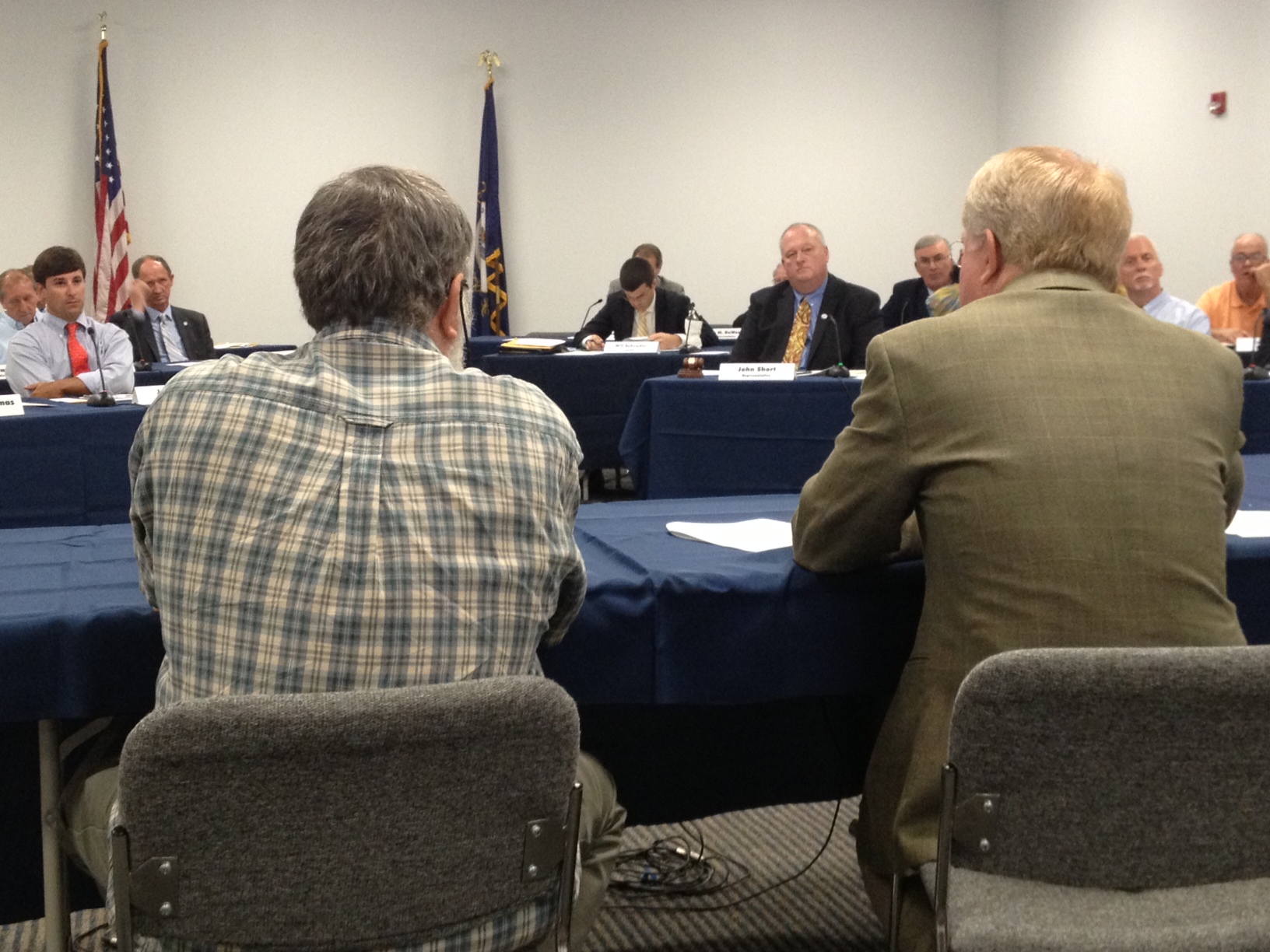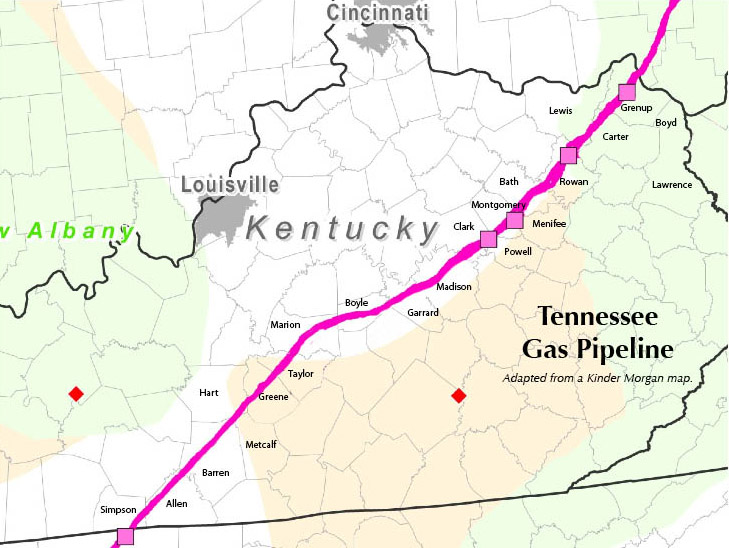Legislators asked to consider safety of pipelines
Two legislative committee hearings in July focused on pipeline safety in Kentucky.
On July 16, KFTC member Bob Pekny joined Rep. David Floyd to talk about the Pipeline Safety Bill that was introduced in the 2015 legislative session.
“Kentucky is crisscrossed with pipelines of various sorts, most of them related to energy” Rep. Floyd told the Interim Joint Committee on Economic Development and Tourism. “We believe an increase in precautions would be wise.”
“All pipelines are dangerous, they cannot all be treated the same,” Pekny emphasized. “Different pipelines have different dangers.”
 They went on to weave the stories of the proposed Bluegrass Hazardous Liquids Pipeline, which was stopped in April 2014, and the current proposal by Kinder Morgan to repurpose the Tennessee Gas Pipeline from natural gas to hazardous liquids.
They went on to weave the stories of the proposed Bluegrass Hazardous Liquids Pipeline, which was stopped in April 2014, and the current proposal by Kinder Morgan to repurpose the Tennessee Gas Pipeline from natural gas to hazardous liquids.
“There are inherent limitations for detecting leaks,” Floyd added. “We believe more active monitoring is called for.”
Pekny described some of the limitations.
He noted that Bluegrass Pipeline officials told concerned residents not to worry, that pipeline pressure was monitored remotely (from Oklahoma) around the clock and they would respond immediately to any leak.
When residents checked out these claims, they found that “only about one in 20 leaks are found by remote monitoring,” said Pekny, who lives in Woodford County just a half mile from where that pipeline would have crossed the Kentucky River in Woodford County.
Another way that pipeline companies monitor for leaks is to fly over the pipeline looking for dead vegetation.
“That’s kind of alarming that a leak could go on long enough to kill vegetation,” Pekny pointed out.
After much research and questioning, Pekny heard from a pipeline safety engineer that his company’s remote monitoring equipment did not record leaks until there was at least a 1.8 percent drop in pressure.
That may not sound like much, he said, but considering that the Bluegrass Pipeline and Kinder Morgan wants to pump 16 million gallons a day of hazardous liquids through their pipelines, “more than 300,000 gallons per day could leak before their instruments will even tell them it’s leaking.
“We can have a fairly large leak in Kentucky, and even though they are monitoring remotely, they won’t know it’s leaking,” Pekny said.
Floyd’s pipeline safety bill is meant to address some of these concerns. One approach is to require soil and water monitoring to help detect small leaks before they become large leaks.
The legislation also would direct the Kentucky Public Service Commission to become certified to inspect certain gas and hazardous liquids pipelines, and set up a pipeline safety fund to help train and equip local emergency response agencies for pipeline leaks and disasters. A per-mile fee on big transmission pipelines would fund the safety program.
Upon completion of their testimony, Rep. John Short, who was chairing the meeting, jumped to the defense of extractive energy industries. He said, “We have no problems” with oil and gas drilling in his district (Knott and Magoffin counties). “Maybe a little occurrence once in awhile.
“We can’t shut the United States down to make a few people happy,” Short said. “I’m not saying I’m for or against fracking. We just have to turn the lights on.”
Rep. Terry Mills helped get the meeting back on track.
“This is an appropriate discussion for us to have,” Mills said. “We need a balance between economic development and protecting the environment. That’s what this is all about.”
Mills expressed concern about the Kinder Morgan re-purposing project which would affect him home of Marion County.
“It bothers me that we are going to run this volatile product through pipelines that have been in the ground 70 years,” Mills said. “I have serious questions if this is the safest.”
Other supportive comments were offered by Reps. Arnold Simpson and James Kay, and Sens. Reginald Thomas and Mike Wilson.
The following day, the Special Subcommittee on Energy got an overview of federal pipeline safety program and concerns about shortcomings in those program.
Arthur Buff of the U.S. Pipeline and Hazardous Materials Safety Administration reported that there are more than 36,000 miles of energy-related pipelines in Kentucky, almost all used for natural gas transmission and distribution. There are 916 miles of hazardous liquids pipelines in Kentucky.
Buff downplayed PHMSA’s lack of resources to adequately inspect these pipelines, but Tom FitzGerald of the Kentucky Resources Council did not.
“They don’t have the resources; they don’t have the staff,” FitzGerald said, pointing out that PHMSA has “137 inspectors for hundreds of thousands of miles of lines [nationwide].”
FitzGerald also said, “The concern that many folks have is that no one is really minding the store on the federal level.” He said projects like Kinder Morgan’s re-purposing project requires “no permit, no advance review” by any federal agency.
He also pointed out that the Kentucky Public Service Commission has no jurisdiction and local government jurisdiction was been pre-empted by the General Assembly in 2003.
Pekny also spoke briefly at this hearing, emphasizing the need for the legislature to be proactive on the safety concerns, particularly for projects like the Bluegrass Pipeline or Kinder Morgan project.
“I’d like you to understand that because it’s a liquid instead of a gas, every linear foot of this pipeline has the explosive capabilities of one ton of dynamite,” Pekny pointed out.
“Even if this were a brand new pipeline, PHMSA has guidelines that a pipeline of this diameter ought to be set back a minimum of 5,000 feet” from any home or public space. “If they were putting this pipeline in now, it would not be allowed to be put in where it is.”
Recent News
Kentucky’s past legislative session showed alarming trend toward government secrecy
Churchill Downs takes more than it gives. That's why the Kentucky Derby is a no-go for me
‘We must never forget.’ Kentucky town installs markers for lynching victims.
Featured Posts
Protecting the Earth
TJC Rolling Out The Vote Tour – a KFTC Reflection Essay
KFTC Voter Empowerment Contractor Reflection Essay
Archives
- Home
- |
- Sitemap
- |
- Get Involved
- |
- Privacy Policy
- |
- Press
- |
- About
- |
- Bill Tracker
- |
- Contact
- |
- Links
- |
- RSS

